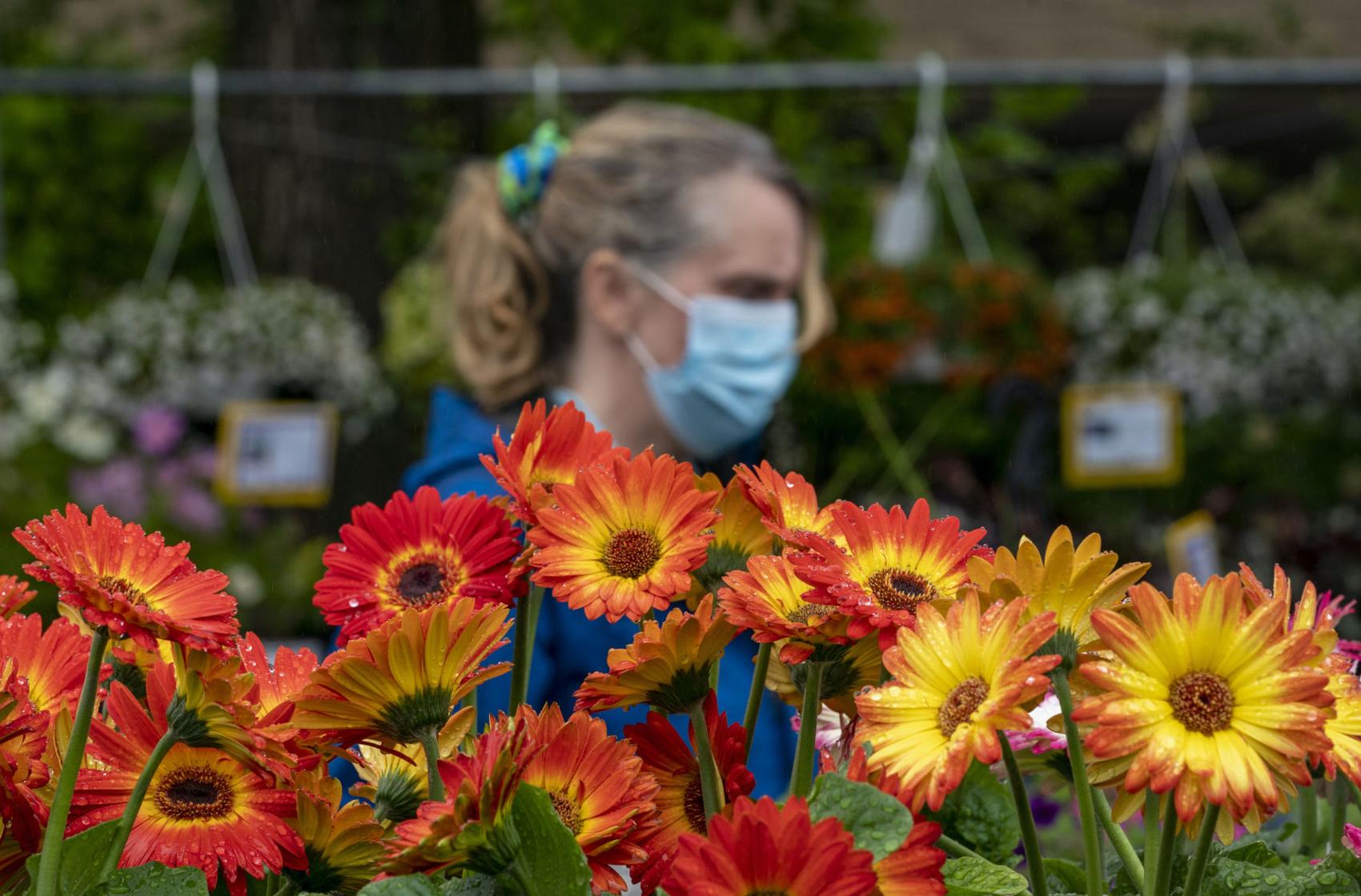Virginia’s new COVID-19 workplace standards amount to unfunded mandates on businesses

Displays of brightly-hued blooms soak up the rain as Cathleen Trail of Arlington, Va., visits an outdoor shop for colorful flowers to add to her porch planters Friday, May 22, 2020, in McLean, Va., just outside Washington.
(The Center Square) – Virginia business groups are decrying the expanded COVID-19 regulations adopted by the Department of Labor and Industry, which include unfunded mandates and additional training and sanitization requirements.
Virginia became the first state to adopt temporary COVID-19 workplace safety and health standards last week through a vote by the department’s Health Codes Board, which did not consider many of the concerns from business associations.
Some of those mandates will cost money. For example, businesses will need to provide face masks for patrons who do not have them and will need to install physical barriers in certain situations. Businesses also will be forced to follow sanitation guidelines and provide training to their employees so they know how to follow them.
The Department of Labor and Industry will not provide any funding for these businesses to accomplish these tasks, Jennifer Rose, the cooperative programs director for the Virginia Occupational Safety and Health Program, confirmed with The Center Square.
Small businesses that do not have attorneys on staff likely will have to hire consultants and attorneys to ensure they are properly complying with all of the new regulations, Nicole Riley, the Virginia state director of the National Federation of Independent Business, told The Center Square.
Requiring physical barriers and face masks for customers also can become a costly burden for small businesses that already are suffering, Riley said. Mandatory training requirements also could cost companies money because they will have to take workers off the production lines, she said.
The requirement to provide customers with face masks also shifts some of the enforcement burden from the government onto the businesses, according to Riley. This mandate turns business owners into “the mask police” and could put workers in uncomfortable and confrontational situations with customers, she said.
Some of the regulatory language provides some flexibility, such as some mandates being applicable only when feasible, but this also provided an additional worry for Riley, who cautioned this could leave the rule open to interpretation from whoever is inspecting the business.
“That always makes us a little uneasy,” Riley said.
Robert Melvin, the director of government affairs at the Virginia Restaurant, Lodging & Travel Association, expressed similar concerns.
Melvin said his association had been working with partners at the federal level to develop training for businesses in line with the guidance from the Centers for Disease Control and Prevention. He now worries, however, businesses will need to retrain all of their employees to ensure compliance with the new standards.
The additional cost burden for small businesses that need to put up physical barriers and provide face masks also concerned Melvin.
Among the new mandates were other regulations the business advocate groups believed could be burdensome for some businesses.
A requirement that businesses must develop procedures to report COVID-19 symptoms could be burdensome, especially for small businesses, Melvin said. He also criticized a regulation that prohibits employers from firing someone if they refuse to go into an area they deem unsafe, which he said could be used by employees to stay home indefinitely and collect unemployment.
Another regulation designed to protect workers could have negative implications, Riley said. An employer will be prohibited from firing an employee for reporting alleged Department of Labor and Industry violations through social media, which Riley said prevents an employer from defending himself against false allegations. She said workers should be protected when reporting violations to the department, but extending those protections to social media posts is an overreach.
Riley and Melvin said money from the state would be helpful for businesses trying to adhere to the new mandates.
The General Assembly is convening a special session Aug. 18 and will address COVID-19-related issues. Legislative leaders did not respond to requests for comment from The Center Square about whether they would consider funds for businesses to help them comply with the mandates.
The new regulations are expected to go into effect next week. They will be in effect for six months but can be made permanent through a process defined by state law.

